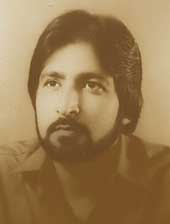Ravindra Kaushik
Ravindra Kaushik | |
|---|---|
 | |
| Born |
11 April 1952
Sri Ganganagar, Rajasthan, India
|
| Died | November 2001 (aged 49)
Central Jail Mianwali, Pakistan
|
| Other names | Black Tiger |
| Alma mater | University of Karachi |
| Known for | Spying for R&AW |
| Criminal charge | Espionage |
| Criminal penalty | Life imprisonment |
| Spouse |
Amanat (m. 1976) |
| Children | 1 |
| Espionage activity | |
| Allegiance | India |
| Agency | Research and Analysis Wing |
| Service years | 1975–1983 |
| Alias | Nabi Ahmed Shakir |
Ravindra Kaushik (11 April 1952 – 21 November 2001) was an Indian Research and Analysis Wing agent who spied for India from 1975 until captured in 1983.
Also known as The Black Tiger, he is considered as one of India's greatest spies.
He penetrated the Pakistan Army and reached the rank of major.
Early life
Ravindra Kaushik was born in Sri Ganganagar, Rajasthan on 11 April 1952 in Brahmin family. His father, J. M. Kaushik, was an Indian Air Force officer; his mother Amla Devi died in 2006. He did his graduation from S. D. Bihani P. G. College, Sri Ganganagar, earning a B.Com and was involved with theatre acting and debates while in college when he was recruited by the R&AW.
Recruitment in Research and Analysis Wing
Kaushik was trained in Delhi for two years to be an undercover Operative in Pakistan. He was also trained to live life as a Muslim and was taught the Urdu language. Being from Sri Ganganagar, a city near Rajasthan's border with Punjab, he was well versed in Punjabi, which is widely understood in Punjab (India) and Pakistan as well. In 1975, at the age of 23, he was sent to Pakistan.
Activities in Pakistan
Kaushik converted to Islam, underwent circumcision and was given the cover name "Nabi Ahmed Shakir". After successfully getting admission in Karachi University, he completed his LL.B. After his graduation, joined Pakistan Army as a commissioned officer and was eventually promoted to the rank of major. He married a local girl named Amanat, the daughter of a tailor in one of the army units, and fathered a boy, who died in 2012–2013.
From 1979 to 1983, Kaushik worked as a Pakistani army officer, sending valuable information to India's R&AW. He was given the title of 'Black Tiger' by the Prime Minister of India Indira Gandhi.
Death and aftermath
In September 1983, R&AW sent a low-level operative, Inyat Masih, to get in touch with Kaushik. But Masih was exposed by Joint Counter-intelligence Bureau of Pakistan's Inter-Services Intelligence and blew Kaushik's cover. Kaushik was captured, and tortured for two years at an interrogation center in Sialkot. He was sentenced to death in 1985; his sentence was later commuted to a life term by the Supreme Court of Pakistan. He was kept in various jails in various cities, including Sialkot, Kot Lakhpat and in Mianwali jail for 16 years. He managed to secretly send letters to his family in India, which revealed his poor health and the trauma he faced in Pakistani jails. In one of his letters, he wrote:
Kya Bharat jaise bade desh ke liye kurbani dene waalon ko yahi milta hai?" (Is this what people who sacrifice their lives for a big country like India get?)
In November 2001, he died of pulmonary tuberculosis and heart disease in Central Jail Mianwali in Pakistan.
According to Ravindra's family, the Indian government had refused to recognise him and had made no effort to help him.
Ravindra's family claimed that the storyline of the famous Bollywood film Ek Tha Tiger released in 2012 was based on the life of Ravindra, and asked for credit in the movie titles for Ravindra. But the director Kabir Khan denied their claim. Romeo Akbar Walter, a 2019 Indian film written and directed by Robbie Grewal is loosely based on his activities in Pakistan. John Abraham plays the role of Rehamatullah Khan, based on Ravindra Kaushik, in the film.
See also
Further reading
- S Hussain Zaidi; Brijesh Singh (2018). Dangerous Minds: Eight Riveting Profiles of Homegrown Terrorists. Penguin Random House. pp. 61–63. ISBN 978-93-86495-99-0.
- Presley Thomas (6 December 2009). "The real life behind a 2002 spy thriller". Hindustan Times.